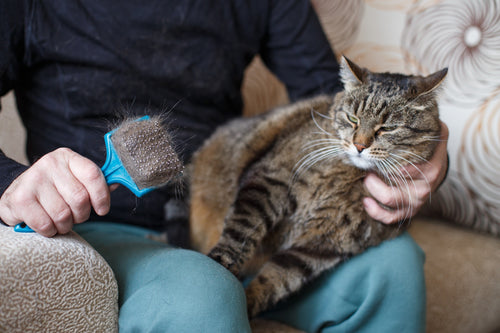If chewing is one of your dog’s favorite pastimes, then he’s already on the right track when it comes to promoting his own dental health. However, a common misconception among dog owners is that chewing alone is sufficient when it comes to dogs and dental hygiene.
Chewing may naturally clean plaque from the teeth, but don’t overlook supplemental dental care for your dog. Besides, it’s about so much more than just keeping your canine’s teeth looking clean and shiny. Doggie dental care is a key factor when it comes to your dog’s overall health.
Why Dog Dental Health Matters
Plaque is unavoidable, but it’s certainly removable… to an extent. If this soft layer of gunk isn’t removed from your dog’s teeth on a daily basis, it will eventually harden and turn into tartar (which is much more difficult to remove).
Tartar firmly attaches to the teeth and then digs into and underneath the gums. This can lead to gum swelling and deterioration. Not only is this uncomfortable, it can lead to more serious oral health issues such as infection, loss of teeth, and tooth root abscesses.

Preventative Dental Care for Your Dog
Fortunately, most dog dental problems can be prevented by implementing proper oral hygiene practices.
Chewing
Chewing provides your pup with a healthy, entertaining outlet for stress and excess energy. Plus, it naturally scrapes plaque from the teeth. That being said, you’ll want to make sure your furry friend has access to safe, dog-friendly chew toys. Otherwise, he may go searching for your new shoes, or other objects that you don’t necessarily want him putting in his mouth.
If you give your dog a bone, which contains bacteria-fighting enzymes, make sure it’s raw and large enough that it can’t be swallowed. Avoid cooked bones, as they can break and splinter and lead to choking or internal damage. If you prefer rawhide, make sure you’re opting for a high-quality brand or safe alternative.
While commercial chew toys can be perfectly suitable, you can also give your dog raw or frozen full-size carrots, frozen peanut butter, and other dog-friendly treats.
Additionally, Pet Honesty’s chewable Oral Hygiene Fresh Sticks can promote your pup’s dental health using natural ingredients such as green tea extract, peppermint oil, and enzymes to keep his breath smelling fresh.
Brushing
While chewing is vital to your dog’s dental health, it’s not sufficient on its own. There’s no replacement for the work that a canine toothbrush can do. In fact, brushing is the best way to clean your dog’s teeth.
Implement regular tooth brushing (daily is best) into your dog’s routine as early as possible. Find a calm, quiet spot in the house and make the experience as stress-free as possible to promote a positive association. Use a canine toothbrush and dog-friendly toothpaste; some dog owners also prefer finger brushes or dental wipes.
Of course, you can’t forget about rewards and praise for good behavior once you’re done!
Diet and Supplements
In addition to brushing and chewing, you can support your dog’s dental health from the inside out through diet and supplements. A healthy, well-balanced diet will support your dog’s immune system and overall health, teeth and gums included.
Antioxidants help to protect your dog’s gums by supporting a healthy inflammatory response. They can be taken in the form of supplements, or obtained through dog-friendly foods such as blueberries, blackberries, raspberries, squash, carrots, sweet potatoes, broccoli, spinach, kale, and green beans.
Fatty acids can also help with dental health issues while also promoting joint, heart, kidney, and brain health. Fish oil supplements are a great way to help your pup get his fix of Omega-3s.
Pet Honesty’s Oral Hygiene Dental Water uses natural ingredients including zinc, Vitamin C, Chlorophyllin, sage, and cinnamon. Add one capful of this odorless, flavorless solution to Fido’s water bowl twice daily to support healthy gums and overall dental health.

Signs of Oral Health Issues in Dogs
Because dogs instinctively hide their pain, you may not realize your dog is struggling with dental health problems until the pain is practically intolerable.
However, there are plenty of other symptoms to watch out for which could indicate problems with your dog’s dental health. Common symptoms include:
- Appetite loss/reluctance to eat, or difficulty eating
- Unexplained weight loss
- Favoring one side of the mouth while chewing
- Excessive drooling
- Nasal discharge
- Swelling under the eye
- Bad breath
- Discolored, broken, loose, or missing teeth
- Red, swollen, or bleeding gums
- Pawing at the teeth or mouth
- Aversion to being touched on the head
While preventative dental care is key, there are some factors that could increase your dog’s risk of oral health issues such as underlying medical conditions, breed, age, and genetics. Some issues are seemingly random, such as a delayed loss of baby teeth which can lead to overcrowding and further oral health issues. Behavioral issues such as excessive chewing can also lead to dental issues.
If you notice any significant changes in your dog’s behavior or appearance, it’s never a bad idea to contact your vet.
Sources:
https://pets.webmd.com/dogs/guide/tips-better-dental-health-dogs
https://www.akc.org/expert-advice/health/keep-dog-teeth-clean/
https://be.chewy.com/basic-dental-care-tips-for-dogs/
http://www.animalplanet.com/pets/healthy-pets/dental-dog-care-tips-tricks/






